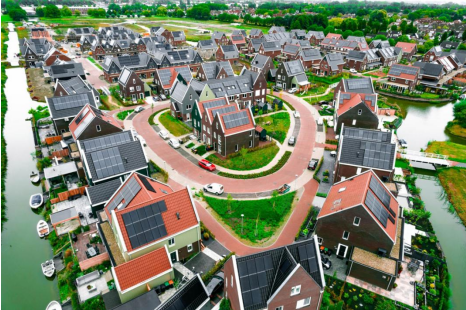Solar advocates often talk about how solar energy helps the planet, but may not explain in detail the environmental benefits of using it. So you might be wondering, “Are solar panels environmentally friendly?”
If you’re considering installing a solar system for your home, workplace, or community, let’s take a look at how photovoltaic (PV) systems affect the environment and why solar energy is green.
Solar power is a renewable energy source, which means it doesn’t deplete the planet’s finite resources like fossil fuels do. Solar panels harness the sun’s energy and convert it into electricity without emitting greenhouse gases or other harmful pollutants into the atmosphere. This process greatly reduces our dependence on non-renewable energy sources such as coal or natural gas, which are the main causes of climate change.
Environmental benefits of solar energy
One of the main environmental benefits of solar energy is its potential to mitigate climate change. As mentioned earlier, solar panels do not emit greenhouse gases during operation, which means they do not contribute to the warming of the Earth’s atmosphere. By harnessing sunlight to generate electricity, we can reduce our carbon footprint and combat the harmful effects of climate change.
The solar power can help improve air quality. Traditional energy sources such as coal or natural gas emit harmful pollutants such as sulfur dioxide, nitrogen oxides, and particulate matter. These pollutants have been linked to respiratory disease, cardiovascular disease, and other health problems. By turning to solar energy, we can reduce the release of these pollutants, resulting in cleaner, healthier air for everyone.
Solar panels require very little water to operate compared to other types of energy generation. Conventional power plants typically require large amounts of water for cooling, which can put a strain on local water resources. In contrast, solar panels only need to be cleaned occasionally to maintain optimal performance. Reducing water usage is especially beneficial in areas where water is scarce or arid.
Another aspect to consider is the life cycle of solar panels. While the manufacturing process does require energy and resources, the environmental impact is minimal compared to the potential benefits of solar panels over their lifetime. On average, solar panels can last 25 to 30 years, during which time they produce clean energy without emitting any emissions. At the end of their useful life, the materials used in solar panels can be recycled, thus reducing waste and further minimizing their environmental impact.
In addition, solar energy systems promote energy independence and resilience. By generating electricity locally, communities can reduce their dependence on a centralized power grid and decrease their vulnerability to blackouts or power interruptions. This decentralization of energy production also reduces the need for long-distance transmission, minimizing energy losses during transmission.
Conclusion
In conclusion, solar energy is undoubtedly an eco-friendly source of energy because of its potential to be renewable, reduce greenhouse gas emissions, improve air quality, minimize water consumption, and promote sustainability and resilience. As solar technology continues to advance and become more widespread, the utilization of solar energy can play an important role in addressing environmental challenges and creating a sustainable future.
Post time: Jul-21-2023
